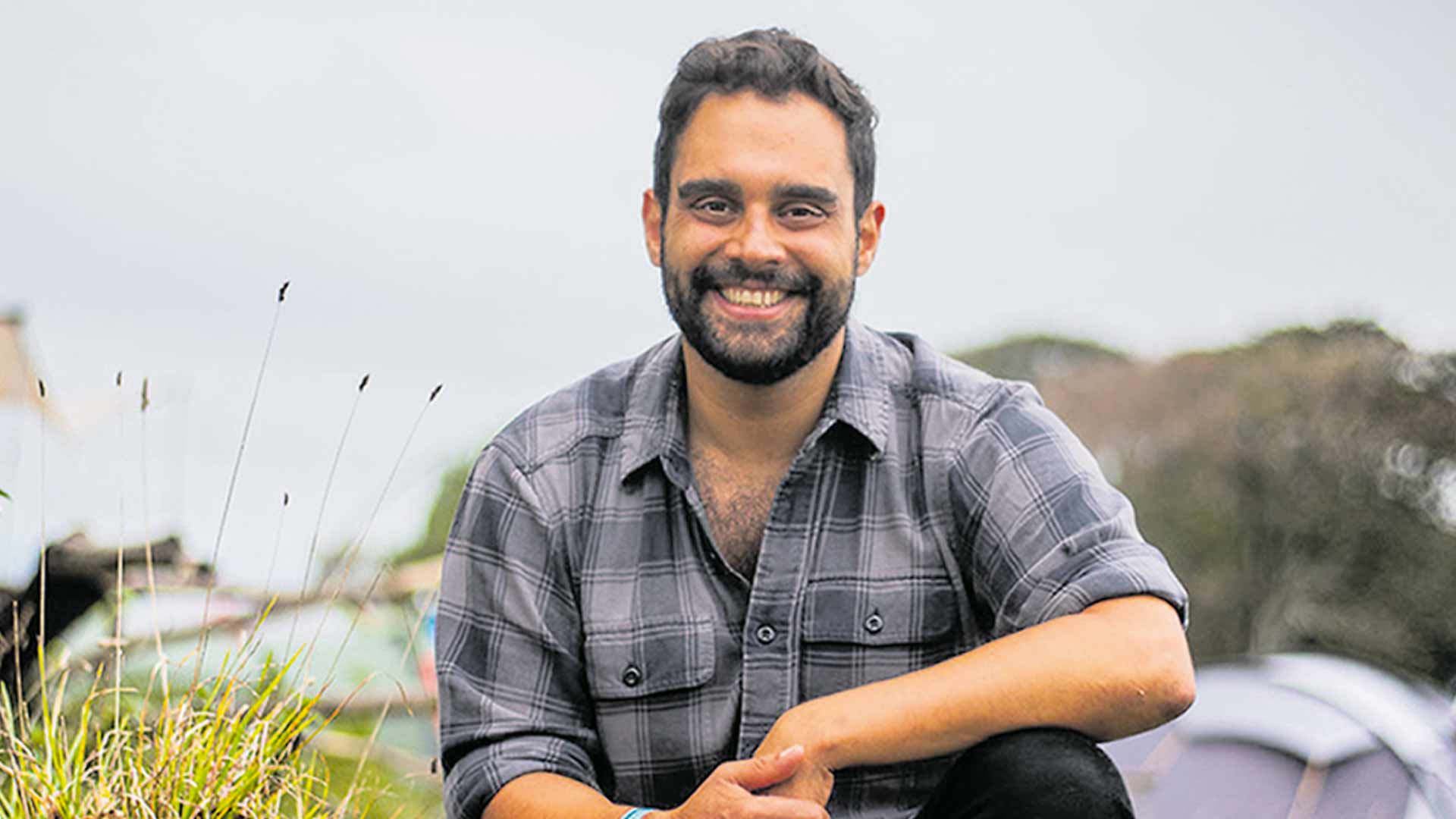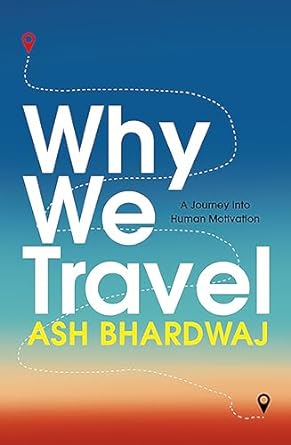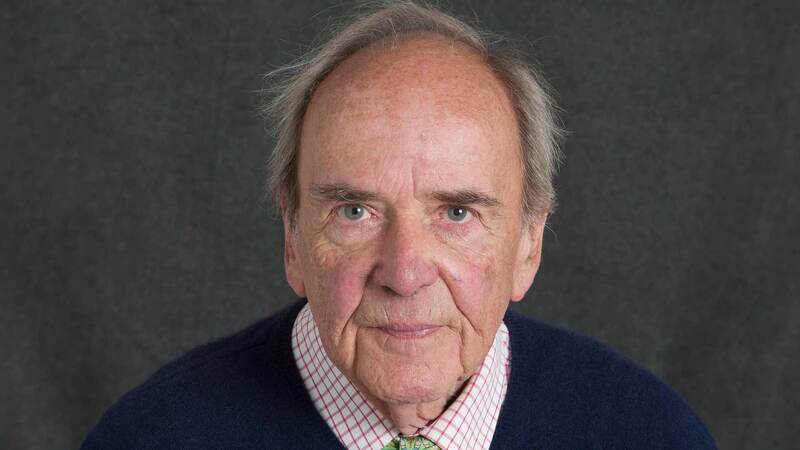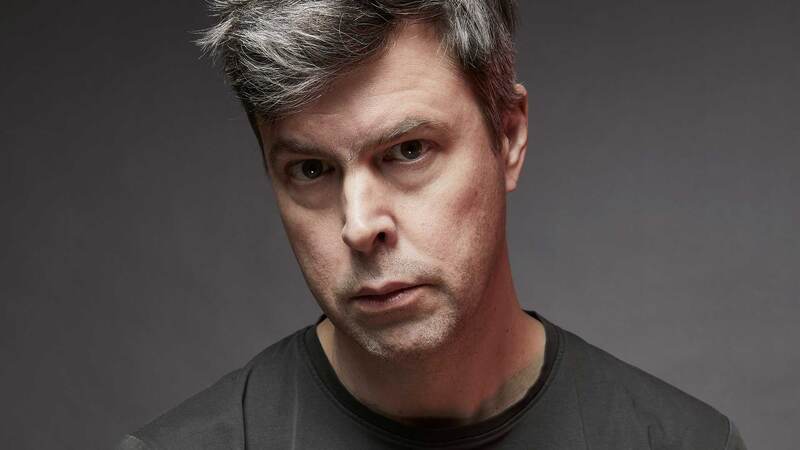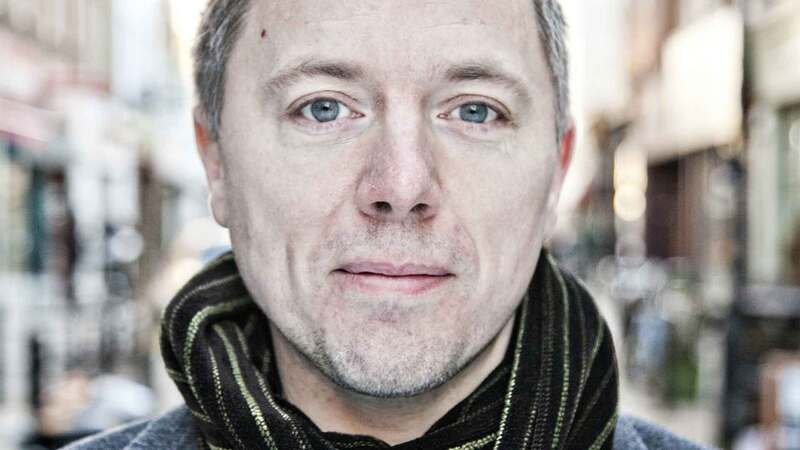Journalist Ash Bhardwaj explores the human desire for reaching new horizons
The writer and film-maker Ash Bhardwaj, whose travels have taken him from Uganda to the Himalayas, on our need to cross borders.
Ash Bhardwaj apologises for the state of his kitchen, today’s makeshift office, where he sits in the aftermath of his toddler’s breakfast. Bhardwaj, a travel journalist and film-maker who’s walked 800km through India, meeting the Dalai Lama on the way, and retraced Second World War secret missions through Albania’s mountains on foot, is at home in London and firmly back in the land of reality.
In many ways he is just as busy when not travelling. When the rucksack and binoculars are safely stored away, there’s much on his plate in the day-to-day: as a writer, with bylines gracing the Sunday Times Travel, Guardian and High Life, and as a lecturer in journalism at City, University of London—a continuation of teaching secondary-school chemistry and physics. Science and space were his “first loves before travel writing”, it turns out.
Fatherhood, too, has impacted his movements. While I suspect there’s a book brewing on the subject, his first is already written and bound: Why We Travel, and it’s a sublimely smart one at that. Equal parts memoir, smart thinking and travelogue, it’s a philosophical inquiry into the human desire to go places big or small, by way of Bhardwaj’s own life. It recalls Sapiens and The Power of Geography, two significant works of non-fiction that Bhardwaj looks up to with great respect, hoping his treatise on travel has similar cut-through.
Bhardwaj explains that Why We Travel came about after a personal revelation. “I found myself being commissioned to write a lot about holidays, and this came with the assumption that people just wanted to rest and relax, have fun or consume. I realised that wasn’t how I travelled.”
For this intrepid explorer, who’s covered 8,500km overland, from the top of Norway to Romania, exploring former Soviet countries in between (the journey became a six-part podcast called “Edgelands”), the mismatch in travel motivations sparked the idea for the book. He says: “It brought up endless questions about the environment, social issues, tourism in cities such as Barcelona and Venice, and the impact of building in fragile habitats. All these things made me want to write a book about making the most out of travel: how do we travel better, and why we are doing it in the first place?”
Why We Travel is split into 12 perspectives: curiosity, inspiration, happiness, mentorship, serendipity, hardship, service, healing, wonder, empathy, eroticism and hope. Bhardwaj sums it up as a “magic-carpet ride into philosophy, science and everything else”. It’s easy to be captivated by Bhardwaj, a man who’s out to clock up more miles than the average car. He’s walked 1,100km through Uganda and Sudan with the renowned explorer Levison Wood, and trekked to Mount Everest Base Camp with wounded soldiers. He’s a modern-day adventurer and destined to be the most interesting man in the room. And he’s not just good at expeditions. His life is punctuated with the kind of once-in-a-lifetime experiences that surely happen only in movies, such as being a cowboy in Australia, a rugby player in New Zealand and a ski instructor in Switzerland. I pity the task of fitting his CV onto one side of A4.
Pastures new
Life started out in ordinary fashion in the non-mountainous and dune-free environs of Windsor. Brought up by a single mother, who took on a second job as a cleaner, Bhardwaj says they never lacked for food or clothing but “fancy holidays” didn’t ever factor. It was a school trip with the rugby team to New Zealand that served as his first ticket to meaningful travel. “The other people I was travelling with weren’t really interested in New Zealand, they were just interested in not being at home. My thoughts were: ‘You’re here on the other side of the world. Isn’t that exciting?’ ”
Bhardwaj writes about this flowering curiosity in the opening section of Why We Travel, linking his first brush with pastures new with the latest thinking. “Curiosity is so integrally linked with what distinguishes humans from other animals and even from other primates,” he says, summarising a discussion with Dr Emily Emmott, one of the academics and scientists he interviewed for the book. “We understand biological evolution, but cultural evolution is what has allowed us to adapt to difficult environments very quickly. Curiosity is the process, the accelerant if you like, that allows that to occur.”
People are trying to travel more consciously. They’re not just sightseeing and going to the Eiffel Tower or hopping on a cruise ship. They want travel to be more fulfilling, and they’re looking for advice on how. This book does that
Why We Travel continues in this format, blending Bhardwaj’s colourful life with persuasive arguments on the desire to day-trip and discover new places. There’s room to contemplate the discovery of “DRD4”, known as the “Wanderlust Gene”, the privileges of travel and how travel is used as a form of identity (“it’s used on Tinder as a descriptor—not that I use it!”). These discussions have come into sharper focus since the pandemic, he adds. Back on the move in earnest, travellers are “more aware of their impact” on the world. As a result, Why We Travel is the right book at the right time, interrogating the biological and social reasons we wheel our suitcases out. “People are trying to travel more consciously. They’re not just sightseeing and going to the Eiffel Tower or hopping on a cruise ship. They want travel to be more fulfilling, and they’re looking for advice on how. This book does that.”
In Bhardwaj’s words, the book is defined as “smart-thinking travel”, adding: “It’s a new sub-genre almost.” He credits the team at Bedford Square, an independent publisher founded in 2022, for understanding its potential and place in the market. “I spoke to a couple of different publishers and they really didn’t know what they would do with the book.”
For example, it’s not a guide on the latest hotspots and it doesn’t list details of destinations off the beaten track. Bhardwaj is out to change mindsets, not just itineraries. “There’s this idea, hammered into us by travel marketing, that we need to go further and have a more luxurious time, to travel well. If you look at the 12 different motivations that the book explores, they can all be encountered without going far.”
As if to prove his point, Bhardwaj mentions his upcoming trips, which are mainly on home soil. “I have lots of walks planned around Britain, including the Wye Valley in a couple of weeks’ time.”
That’s not to say he’s putting his passport and compass away anytime soon. “I like to go to the ‘nine-dash line’,” he reveals—a looped area around the South China Sea that’s contested between China and surrounding countries including Taiwan, Malaysia, Thailand and Vietnam (the last banned the recent “Barbie” movie for depicting the ‘dashes’ on a map in the film). “The conflict between these nations that are trying to hold out against Chinese expansion is fascinating,” he says, itchy feet in evidence.
Book extract: Why We Travel
I have travelled in many different guises: as a backpacker and as a soldier, on expedition and on holiday, in groups and on my own, for work and for fun. I went for sport and for love, as a journalist and as a pilgrim, a teacher and a student, and I learned as much about myself as I did about the world. Travel was my gateway to ideas and education.
As I built a career in travel journalism, I began thinking about the purpose of elective and leisure travel (as against migration for economic or security reasons). For many people, travel sits alongside homeownership and marriage as a significant life goal, and we Brits spend more on package holidays than we do on any other leisure activity.
As I reflected on my own reasons for travelling, I became curious about why other people travelled. I started by asking my friends and colleagues, then I interviewed scientists, philosophers, DJs and athletes. I read everything from historical poetry to religious texts, and I became acquainted with niche scientific research. It was an incredible journey into the minds of others, and I brought some of their motivations into journeys of my own.
I look at how travel intersects with our lives, and question its hold over us. Why do we travel? How do we do it ‘better’? Can it help us to live more fulfilling lives?
That’s not to say he’s putting his passport and compass away anytime soon. “I like to go to the ‘nine-dash line’,” he reveals—a looped area around the South China Sea that’s contested between China and surrounding countries including Taiwan, Malaysia, Thailand and Vietnam (the last banned the recent “Barbie” movie for depicting the ‘dashes’ on a map in the film). “The conflict between these nations that are trying to hold out against Chinese expansion is fascinating,” he says, itchy feet in evidence.





